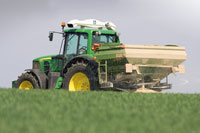Intensive farming has slowed climate change, say US researchers

Intensive farming has slowed rather than increased global warming, according to US researchers.
Agriculture is often cited as a major source of greenhouse gases because of the reliance on fertilisers, pestcides and mechanisation in conventional farming systems.
However, a report published in the Proceedings of the National Academy of Sciences, has concluded without the adoption of such technologies even more greenhouses gases would have been emmitted.
The paper has concluded the Green Revolution of the late 20th century increased crop yields worldwide and helped feed an expanding global population.
Without these advances, the conversion of vast natural areas to agriculture would have caused much more greenhouse gas emissions—the equivalent of nearly 600 billion tons of carbon dioxide since 1961.
“That’s about 20 years of fossil fuel burning at present rates,” said study co-author Steven Davis of the Carnegie Institution’s Department of Global Ecology.
“Our results dispel the notion that industrial agricultural with its petrochemicals are inherently worse for the climate than a more ‘old-fashioned’ way of doing things.”
The research team claimed that although the various inputs to modern farms require more energy and greenhouse gas emissions per unit of food output than did the lower-input methods of the past, crop yields have increased by 135%, reducing the amount of cropland needed to produce the same amount of food.
“Converting a forest or some scrubland to an agricultural area causes a lot of natural carbon in that ecosystem to be oxidised and lost to the atmosphere” said Mr Davis .
”What our study shows is that these indirect impacts from converting land to agriculture outweigh the direct emissions that come from the modern, intensive style of agriculture.”
The researchers also calculated the benefits of investing in agricultural research as a strategy for reducing greenhouse gas emissions.
They estimated that since 1961 agricultural research has averted carbon dioxide emissions at a cost of about $4 per ton of carbon dioxide.
They suggested agricultural advances have prevented about 13 billion tons of carbon dioxide emissions each year, much more than the estimated 1.8 billion tons obtainable by improvements in energy supply or the estimated 1.7 billion from improved transportation systems.
“Agricultural research is one of the cheapest ways of preventing greenhouse gas emissions,” said Mr Davis. “And if the past few decades are a guide, it is also a large source of potential reduction.”
